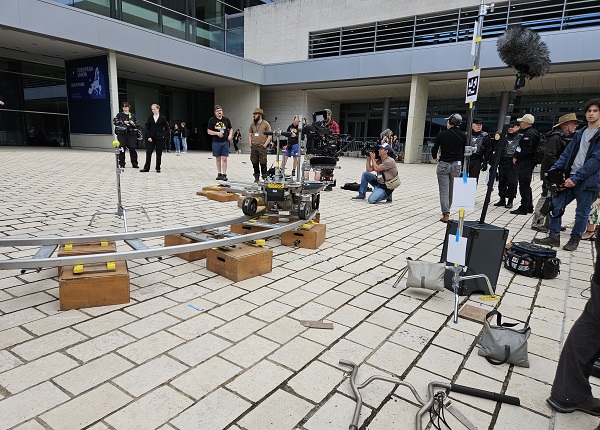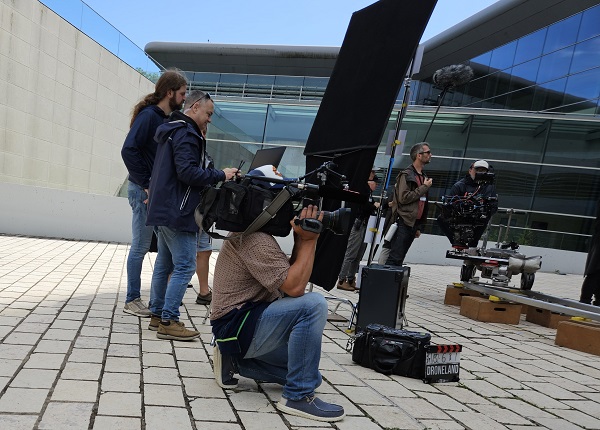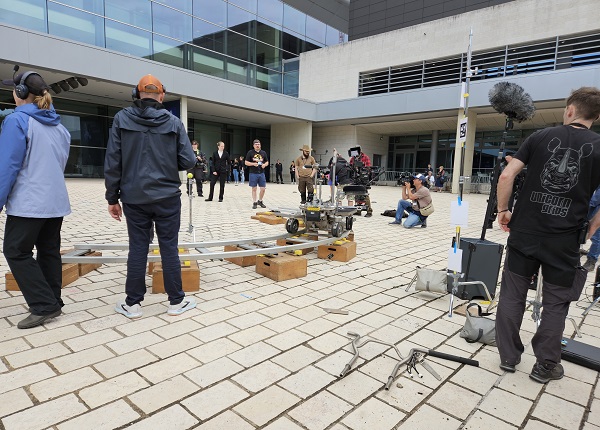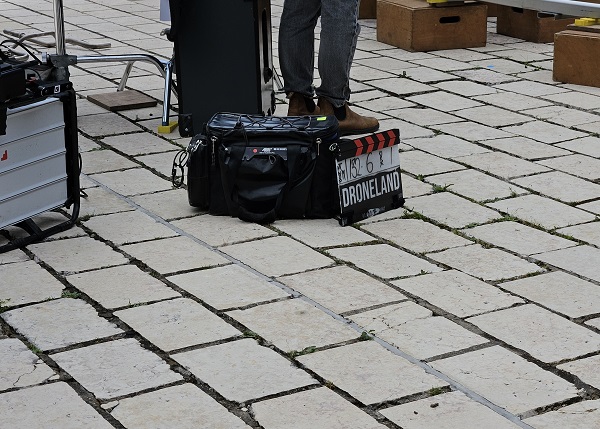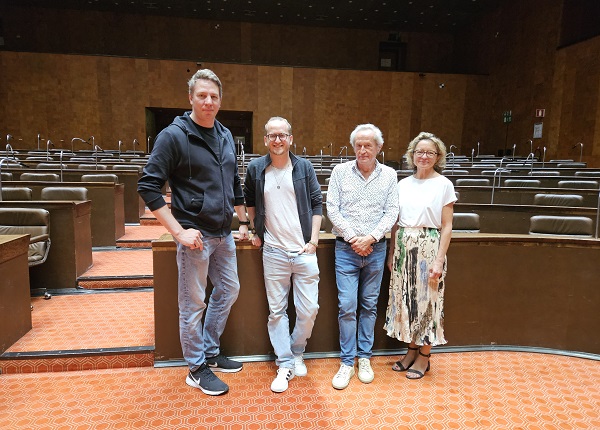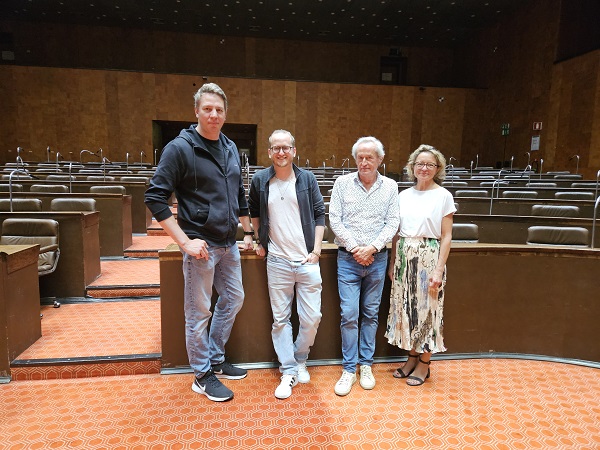 (L-R) Félix Koch; Pierre Majerus; Nicolas Steil; Katarzyna Ozga;
Credit: Jazmin Campbell, Chronicle.lu
(L-R) Félix Koch; Pierre Majerus; Nicolas Steil; Katarzyna Ozga;
Credit: Jazmin Campbell, Chronicle.lu
On Monday 21 July 2025, Chronicle.lu attended a press day on the Luxembourg set of Droneland, a new high-end dystopian thriller series developed for the international market.
Co-produced by Luxembourg, Germany, the Netherlands and Poland, the six-episode show is now in its final weeks of filming.
Funding & Distribution
Based on Tom Hillenbrand’s bestselling novel Drohnenland, Droneland has a total budget of €15,234,000, including more than €3 million in financial support from Film Fund Luxembourg (€120,000 for development and €3 million for production). Executive producer and showrunner Nicolas Steil described the production as the "first high-end series" of its kind in Luxembourg, highlighting its innovative cross-border financial structure.
In addition to Film Fund Luxembourg, the project has received funding from the Council of Europe's Pilot Programme for Series Co-Productions (€500,000) and Media TV Programming (€1 million), as well as from Creative Europe MEDIA, the Co-development Fund Greater Region, AGICOA Europe, the German Motion Picture Fund (GMPF), Mitteldeutsche Medienförderung (MDM), Medienboard Berlin-Brandenburg (MBB) and production incentives from Germany, the Netherlands and Poland.
The series is produced by Iris Group (Luxembourg and Germany), with Nicolas Steil and Katarzyna Ozga as executive producers, in co-production with Syrreal Entertainment (Germany), Topkapi Series (Netherlands) and Enter Film (Poland).
International sales are handled by New Regency, while broadcasting rights have been secured by ZDF and the Magenta TV platform (Germany), as well as RTL Luxembourg and Videoland (RTL) Netherlands. The series is scheduled to air in autumn 2026.
Production Timeline & Plot
Filming began in May in Poland, before continuing in Germany in June, and moved to Luxembourg at the start of July, with locations including the University of Luxembourg in Esch-Belval and the Philharmonie in Luxembourg-Kirchberg, among others. After sixteen filming days in Luxembourg (ending this week), the production is set to wrap in the Netherlands by 2 August 2025.
Set in a near-future dystopian Europe, Droneland envisions a continent gripped by hyper-surveillance, where drones and artificial intelligence (AI) constantly monitor citizens. The story follows Aart Westerfeld, a war veteran obsessed with avenging his wife’s death, and Nina Bittman, an idealistic yet determined Europol agent, as they investigate the murder of a European parliamentarian - only to uncover a tech-fuelled conspiracy that threatens to destabilise the entire continent.
Some of the show's most intriguing concepts include "Mirrorspace", Europol's virtual crime reconstruction tool, and "Eidolon", a meta-world controlled by tech tycoon Emery Tallan. These elements raise provocative questions such as: Is this parallel world better than reality? In a society shaped by augmented realities, who really controls the future?
At its core, Droneland dramatises the increasingly relevant dilemma of freedom versus control. The story is built around a thematic triangle - Freedom. Control. Security. - and explores this dynamic through both personal relationships and the wider political backdrop of an impending election. As Europe teeters on the edge of authoritarian control, Aart and Nina fight to stop a future where freedom is merely an illusion and the foundations of reality itself are threatened.
The series is filmed in English, with select scenes in French and German.
Cast & Crew
The international cast is led by German actor Oliver Masucci (Dark; Look Who’s Back) as the tormented Aart Westerfeld and Luxembourgish actress Sophie Mousel (Capitani) as top investigator Nina Bittman. They are joined by Luxembourgish talents Marc Limpach, Fabienne Elaine Hollwege, Jules Werner, Astrid Roos and Tommy Schlesser, alongside acclaimed European actors such as Sibel Kekilli (Game of Thrones), Alexander Scheer (Blood & Gold) and Elise Schaap (Undercover).
The series was created by Luxembourg film producer and Iris Productions founder, Nicolas Steil, who also serves as showrunner. Direction is shared between Max Zähle (Germany) and Félix Koch (Luxembourg). The screenplay was written by Pierre Majerus (Luxembourg) and Nicolas Steil, in collaboration with Jan Cronauer (Germany) and Christophe Wagner (Luxembourg). The technical team is largely Luxembourgish, including Uli Simon (costume designer), Emilie Franco (hair and makeup designer), Alex Brown (first assistant director), Pascal Charlier (key grip), Christophe Vincent (location manager) and Nadine Chaussonnière (production manager).
Behind the Scenes: Creative Process, Adaptation & Direction
Pierre Majerus, who had already worked for Iris Productions as a creative development executive, has spent more than three years developing the scripts. Initially brought on to translate Nicolas Steil's French drafts into English, he eventually became the series’ principal writer.
Pierre explained that while the series remains true to the novel’s themes, key changes were necessary due to the format, budgetary constraints and location specificities. For instance, a minor reference to Aart Westerfeld’s wife in the novel has become a central plotline, while the character of Nina (named differently in the book) has been elevated to co-protagonist. "In novels, you can write whatever you want, you’re not limited except by your imagination," Pierre noted, adding that this would not have been possible for a six-episode series with a €15 million budget. He highlighted the need to "find a way to tell the story convincingly with the financial possibilities that you have". Some locations were also adapted: Europol is now based in Dresden (Germany) and a scene originally set in Portugal has been relocated to Poland.
Pierre is present on set daily, following the "American model", ready to answer questions and rewrite lines or scenes as needed. Most changes were finalised during pre-production, but minor edits are still sometimes required.
Asked what he most enjoyed about the project, the screenwriter cited the close collaboration with the crew but also his interest in the genre: "I’m a big fan of dystopias and noir-crime stories, so when I was asked to write a dystopian series, I was really excited". He enjoyed reading the novel as research for the series but wanted to develop the relationship between Aart Westerfeld and his wife, as well as the duo dynamic with Nina. "I’m really excited for those changes," he said, adding that the final act of the series will differ significantly from the book’s ending.
For his part, co-director Félix Koch spoke about his constructive collaboration with Max Zähle, noting that they have "learned from each other". Compared to his work on feature films, he noted that the series format - with over 50 days of filming and teams in four different countries - presented unique challenges. "There is a lot to think about," he said.
Visually, the team avoided copying big-budget productions such as Blade Runner: "We tried to find our own style," Félix said, adding that they opted not to rely too heavily on visual effects while creating distinct styles for the series' various "realities".
Regarding the characters and central themes, he said: "This story is about control, freedom and security. We have a character for each of those things, in interaction with each other". Félix also elaborated on the creative choice behind elevating Nina's role: "We pushed a side character more into the light, because otherwise the main detective would work alone all the time. That works in a book because you can read his thoughts, but in a [series] it doesn't work. […] You need somebody to interact with". Speaking about a key narrative shift from the novel, he shared that while the book is told in hindsight, the series introduces urgency and a ticking clock, allowing the protagonists more agency in shaping the outcome.
Asked what drew him to the project, Félix said "you rarely get the opportunity to do science fiction," adding that "the amount of freedom we have doing this is amazing". He added that it was "interesting to find concepts and also solutions, because we don't have Hollywood budgets for this [...]. We have to find solutions for that" and he enjoyed visiting the different countries and working with different people, "because the crews are amazing, very talented people".
In addition to speaking with cast and crew members, journalists attending the press day had the opportunity to watch part of a Droneland scene being filmed outdoors in Luxembourg-Kirchberg, following minor delays due to stormy weather.

